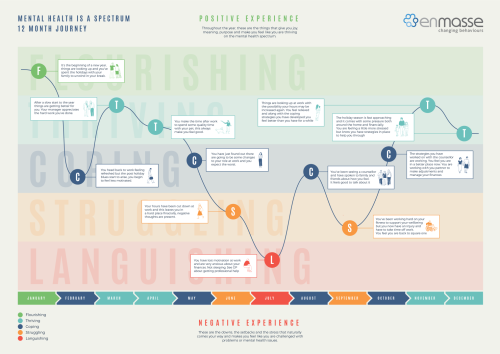Everyone has mental health: the case for a continuum
When I lead webinars on mental health, I sometimes ask participants, “what does mental health mean to you?” Common responses centre around what we might actually call mental ill-health. Terms like anxiety and stress abound.
What’s behind this tendency to immediately associate mental health with dysfunction and distress?
One potentially important factor is how we fundamentally understand and talk about mental health and ill-health. A popular approach has been to believe that someone either has a mental health disorder, or they don’t. While this approach is helpful for gathering statistics and simplifying how we might talk about psychological or emotional distress, it falls far short of describing the human experience.
An alternative to this binary approach is understanding mental health as lying on a continuum. I believe a helpful way to describe the ‘healthy’ end of the continuum comes from the World Health Organisation:
A state of well-being in which the individual realises his or her own abilities, can cope with the normal stresses of life, can work productively and fruitfully, and is able to make a contribution to his or her community. 1
This is, in fact, the operational definition of mental health at the WHO.
At the other end of the continuum, we recognise the very real and human experience of psychological suffering, sometimes very serious mental ill-health. Allow me to rejig the above mentioned definition to help describe mental ill-health:
A lack of well-being in which the individual is inhibited from realising their own abilities, lacks the resources (internally and/or externally) to cope with the normal stresses of life, is restricted from working productively or fruitfully, and struggles to make a meaningful contribution to their community.
Where we find ourselves on this continuum depends on several factors, which I won’t get into in this post. The one factor I would like to highlight is the belief that one can be stuck at one point on the continuum, which is a fundamentally unhealthy mindset. And not only at the ill-health end of the continuum! The belief that we are bulletproof psychologically, that we are impervious to stressors, is in fact a potential precursor to moving very rapidly down the continuum, especially when the stresses of life pile up all at once.
Have a look at this example of a 12-month journey and how life events can influence mental health:

Last but not least, the case for a continuum, for understanding that we all move up and down it continuously, is a case for empathy and compassion. Everyone has mental health, and therefore, everyone at some point experiences some level of ill-health. As we deal with ongoing uncertainty and change, as everyone’s mental health fluctuates alongside these challenges, let’s remember to care for others who are doing it tough, because they matter, and because we could very much find ourselves at the pointy end of the continuum at some point as well. Everyone has mental health, after all.
En Masse offers a comprehensive introductory 1-hour workshop/webinar, Open minds, which touches on this topic as it explores the basics of mental health. Contact us about a program tailored to your audience and need states.
Reference
- World Health Organization (2003). Investing in mental health. World Health Organization, Geneva.


